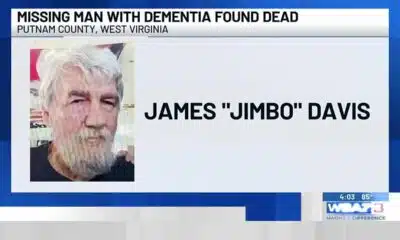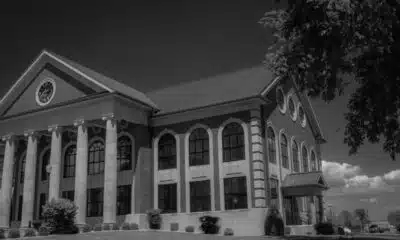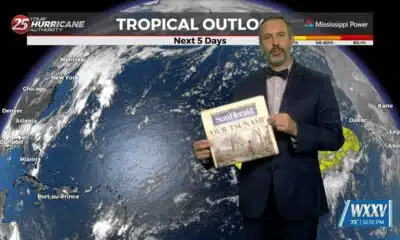News from the South - Texas News Feed
Texas cities may face penalties for progressive policies
“Texas Republican lawmakers may “financially handcuff” cities that don’t play by their rules” was first published by The Texas Tribune, a nonprofit, nonpartisan media organization that informs Texans — and engages with them — about public policy, politics, government and statewide issues.
Subscribe to The Y’all — a weekly dispatch about the people, places and policies defining Texas, produced by Texas Tribune journalists living in communities across the state.
DALLAS — Two years after Texas lawmakers enacted a sweeping law aimed at sapping authority from the state’s urban areas, GOP legislators once more have advanced bills intended to stop local governments from adopting progressive policies.
Republicans in the Texas Legislature want to give the state the authority to effectively torpedo cities’ budgets if they pursue local rules that might conflict with state law — intended to deter them from adopting left-leaning ideas in the first place. GOP legislators have targeted financial assistance programs for needy families, measures to reduce greenhouse gas emissions and initiatives to promote diversity, equity and inclusion. They’ve sought to overturn moves in cities like Austin and Dallas to decriminalize possession of small amounts of marijuana. No issue is too small. Some Republicans even want to make it harder for cities to install bike and bus lanes.
The slate of bills marks the latest front in Texas Republicans’ decade-long crusade to erode the power of local officials in the state’s major urban areas, who often are Democrats. In that time, the GOP-controlled Legislature forbade cities from regulating oil and gas drilling, requiring landlords to accept federal housing vouchers and from cutting their police budgets without going to voters. Conservatives have often couched those moves as ways to relieve the burden they say those regulations place on businesses and stop the proliferation of progressive policies.
Others see Republicans’ push to restrict what policies local governments can pass as stifling local officials’ ability to address local problems.
“It’s the antithesis of conservative, small ‘c,’ government, which is that government at the lowest level will be the representative of the people,” said Steven Pedigo, director of the University of Texas at Austin’s LBJ Urban Lab, which focuses on urban policy. “Texas is not set up to have top-down forms of government.”
As the state grows, it faces mounting challenges on several fronts including transportation, workforce development and water infrastructure. Solving those challenges will require close collaboration between state and local leaders, Pedigo said. That collaboration can’t take place amid continued spats over local control, he said.
“If you’re always fighting at who gets the piece of the pie and who’s at the table, you’re never actually solving the issues,” Pedigo said.
Republicans’ yearslong push against localities reached a new level in 2023 when legislators enacted a far-reaching law dubbed the “Death Star” bill — which lawmakers have sought to build upon this legislative session. That law bars cities and counties from creating local rules that go further than what’s allowed under broad swaths of state law — and gives residents the ability to sue cities and counties if they believe there’s overreach. Gov. Greg Abbott and business lobbying groups had long sought such a law, arguing it was needed to roll back local regulations that harm business owners and hinder the state’s economic growth.
Opponents of the law argued it eradicated local labor protections and made it more difficult for localities to deal with day-to-day matters like excessive noise, among other limitations. The law is in effect, but a group of cities has challenged the law’s constitutionality in court.
In the meantime, GOP lawmakers this session have sought ways to broaden that law and stiffen consequences for localities that attempt to flout it. The Texas Senate last week approved Senate Bill 2858 — which would expand the areas of state law localities couldn’t exceed, allow the state attorney general to sue cities and counties for potential violations of the law and target those localities’ pocketbooks.
The state would freeze that locality’s sales tax and property tax revenue, which make up substantial chunks of local government budgets, for the duration of the attorney general’s lawsuit. If the state prevailed, that city or county would see significant long-term blows to their budget. Not only would the locality lose the sales tax it otherwise would have collected during the lawsuit, it would face stricter limits on how much more in property tax revenue it can collect each year for five years following a loss in court.
Such moves would “financially handcuff Texas cities from serving their residents,” Monty Wynn, a representative of the Texas Municipal League, a lobbying group that represents most Texas cities, wrote to lawmakers in April. The bill “would effectively allow the attorney general to serve as a de facto councilmember in cities across the state and legislate at the local level,” he said.
“City leaders would be inclined to repeal otherwise legal regulations to avoid the exorbitant costs to taxpayers imposed by these bills,” Wynn said. “The result would be a future attorney general dictating local regulations through the threat of litigation.”
State Sen. Brandon Creighton, a Conroe Republican who authored the bill, said Wednesday as senators debated it that such measures are necessary to ensure that cities and counties aren’t overstepping their bounds.
“We want to make sure that our local jurisdictions are following the (Texas) Constitution,” Creighton said. “The Constitution is clear that our local governments are to follow state law and the Constitution itself.”
Senate Democrats balked at the proposal, particularly the freeze on localities’ sales tax revenue before a court had reached a verdict.
“This is a punishment before being proven guilty,” said state Sen. Sarah Eckhardt, an Austin Democrat and former Travis County judge, the county’s chief executive.
Creighton pushed back. The bill would require a trial in such a case to take place within 90 days, he noted, and localities could repeal the disputed policy in that time frame. If the locality prevailed in the lawsuit, they would regain the sales tax plus interest, Creighton said.
The bill cleared the Senate by a 19-12 vote and now heads to the Texas House.
Targeting specific programs
GOP lawmakers this year have also homed in on specific local initiatives. The Senate has advanced a bill to bar cities and counties from creating guaranteed income programs, which provide regular cash payments for needy families. Localities across the country — including Austin, San Antonio and El Paso County — have experimented with such programs in recent years to help poorer households weather high housing costs and inflation.
Harris County officials sought to set up their own guaranteed income pilot program, which aimed to use $20.5 million in federal COVID-19 relief funds to give monthly, no-strings-attached cash payments of $500 to about 1,900 families living in the county’s poorest neighborhoods. The program would have lasted about 18 months.
Conservatives blasted the program as an unfair giveaway of taxpayer dollars. Attorney General Ken Paxton successfully sued the county to prevent it from sending payments to those families. The Senate approved Senate Bill 2010, the bill outlawing such programs, earlier this month.
“Public funds should advance public interests, not be handed out as blank checks in politically motivated pilot projects,” state Sen. Paul Bettencourt, a Houston Republican who authored the bill, said in a statement after the bill passed. “This bill defends taxpayers and reinforces our Constitution’s limits on government giveaways.”
Proponents of guaranteed income programs have pointed to better outcomes for people who receive cash. Beneficiaries of a guaranteed income pilot program in Austin, which restarted its program last year, received $1,000 a month for one year. That cash helped many of them catch up on rent, an Urban Institute review of the program found. Their incomes increased even after they stopped receiving cash assistance, and 30% of recipients said they found better jobs or earned a higher salary, the survey found.
“Why would we be removing tools that could help people from local tool boxes from the state level?” said state Sen. Molly Cook, a Houston Democrat. “Guaranteed income programs work.”
Republicans have also set their sights on cities’ moves to reduce the number of travel lanes for cars on some roads to reduce congestion and allow room on those roadways for dedicated lanes for bicycles and buses. Some GOP lawmakers have blamed those policies in part for a perceived increase in car congestion, but studies show reducing car lanes can decrease traffic and improve road safety.
A bill by state Rep. Giovanni Capriglione, R-Southlake, would effectively make it more difficult for cities to cut the number of car lanes to accommodate other modes of transportation like bicycles and buses without a robust public input process and notifying the Texas Department of Transportation. If a city didn’t follow that process and went ahead of reducing car lanes, they could lose affordable housing funds.
“We need more capacity for drivers, not less,” Capriglione told the House Transportation Committee Tuesday.
Lauren Prieur, who heads Fort Worth’s transportation and public works department, told lawmakers the bill would restrict the city from using “key tools for managing our urban growth.”
“We respect the intent behind this House bill to ensure transparency and reduce congestion,” Prieur said. “However, we believe it can be better balanced with the city’s need for flexibility.”
Several efforts to change how cities do business this session take aim at local rules that determine what kinds of homes can be built and where. Lawmakers want to spur development to take on the state’s housing affordability crisis by relaxing some of those rules and making it easier for housing developers to obtain city building permits. Housing advocates and experts have said those proposals would help relieve the state’s housing woes. However, some cities see it as another attack on their authority.
In one rare area of agreement between Republican lawmakers and local governments, one law would make it harder for residents to challenge zoning changes, providing cover for city councils to make broad changes to allow more housing. The Texas House is expected to vote on that proposal, House Bill 24, Monday.
Disclosure: Texas Municipal League and University of Texas at Austin have been financial supporters of The Texas Tribune, a nonprofit, nonpartisan news organization that is funded in part by donations from members, foundations and corporate sponsors. Financial supporters play no role in the Tribune’s journalism. Find a complete list of them here.
Tickets are on sale now for the 15th annual Texas Tribune Festival, Texas’ breakout ideas and politics event happening Nov. 13–15 in downtown Austin. TribFest 2025 is presented by JPMorganChase.
This article originally appeared in The Texas Tribune at https://www.texastribune.org/2025/05/05/texas-legislature-republicans-progressive-policies-cities/.
The Texas Tribune is a member-supported, nonpartisan newsroom informing and engaging Texans on state politics and policy. Learn more at texastribune.org.
The post Texas cities may face penalties for progressive policies appeared first on feeds.texastribune.org
Note: The following A.I. based commentary is not part of the original article, reproduced above, but is offered in the hopes that it will promote greater media literacy and critical thinking, by making any potential bias more visible to the reader –Staff Editor.
Political Bias Rating: Center-Left
The article presents a critical view of Republican lawmakers in Texas, focusing on their efforts to restrict local government powers, particularly in urban areas that often lean left politically. The tone highlights opposition to these moves, emphasizing their potential to undermine local autonomy and the ability to address local issues. The framing suggests a perspective that aligns with progressive values, particularly regarding issues like diversity, equity, and inclusion, and local governance. While the article presents views from both sides, the overall tone leans towards a critique of the Republican agenda, reflecting a Center-Left perspective.
News from the South - Texas News Feed
University of Texas system students sue, say new law could ban prayers, reporting, music on campus
SUMMARY: Student groups from UT Austin and UT Dallas, supported by FIRE, sued university leaders over Texas Senate Bill 2972, which bans First Amendment-protected speech on public university campuses between 10 p.m. and 8 a.m., and restricts amplified sound, percussion, and invited speakers during finals. The law, linked to recent campus protests, is criticized for infringing constitutional rights and potentially punishing activities like prayer, journalism, music, and political expression. Plaintiffs include Christian, journalistic, musical, and conservative groups, who argue the law threatens free speech and campus support systems. The UT System has yet to respond to the lawsuit.
Read the full article
The post University of Texas system students sue, say new law could ban prayers, reporting, music on campus appeared first on www.kxan.com
News from the South - Texas News Feed
Google says Gmail security warning is ‘false,’ but here’s how you can increase protection
SUMMARY: Recent reports claiming Google warned 2.5 billion Gmail users to change passwords due to a data breach are false. Google clarified there was no major security warning and emphasized its strong protections, blocking over 99.9% of phishing and malware attempts. A limited security incident affected a small number of corporate users earlier this summer, with those impacted already notified. Despite no widespread alert, Google noted increased phishing and credential theft attempts. To enhance security, users are encouraged to use Passkeys, 2-Step Verification, and remain vigilant against phishing emails. Suspicious messages can be reported directly to Google for investigation.
Read the full article
The post Google says Gmail security warning is 'false,' but here's how you can increase protection appeared first on www.kxan.com
News from the South - Texas News Feed
Concern for Dallas PD response time to hit-and-run
SUMMARY: Family members express frustration over Dallas Police Department’s delayed response to a hit-and-run crash on August 23, where a motorcyclist, Karen Williams, suffered serious injuries. The crash occurred around 12:10 p.m., but police did not respond to the hospital until 1:17 p.m., and arrived at the scene after 2 p.m. Witnesses described the reckless driver fleeing and criticized the police’s lack of urgency. Staffing issues were suggested as a cause of delay. DPD labeled the hit-and-run a priority but provided limited explanations, stating the goal response time is 12 minutes, and deferring staffing details to an open records request.
Family members are seeking answers about why it took Dallas police more than an hour to respond to a recent hit-and-run crash that left the victim with a spinal cord injury.
Subscribe to FOX 4: https://www.youtube.com/fox4news?sub_confirmation=1
Dallas news, weather, sports and traffic from KDFW FOX 4, serving Dallas-Fort Worth, North Texas and the state of Texas.
Download the FOX LOCAL app: fox4news.com/foxlocal
Watch FOX 4 Live: https://www.fox4news.com/live
Download the FOX 4 News App: https://www.fox4news.com/apps
Download the FOX 4 WAPP: https://www.fox4news.com/apps
Follow FOX 4 on Facebook: https://www.facebook.com/Fox4DFW/
Follow FOX 4 on Twitter: https://twitter.com/FOX4
Follow FOX 4 on Instagram: https://www.instagram.com/fox4news/
Subscribe to the FOX 4 newsletter: https://www.fox4news.com/newsletters
-
Mississippi Today4 days ago
DEI, campus culture wars spark early battle between likely GOP rivals for governor in Mississippi
-
News from the South - North Carolina News Feed7 days ago
Parasocial party: Why people are excited for the Taylor Swift, Travis Kelce engagement
-
Local News6 days ago
Police say Minneapolis church shooter was filled with hatred and admired mass killers
-
Local News Video6 days ago
08/29 Ryan's “Wet End to the Week” Friday Forecast
-
News from the South - Kentucky News Feed6 days ago
Lexington Man Convicted of Firearms Offenses
-
Mississippi Today7 days ago
Two Mississippi media companies appeal Supreme Court ruling on sealed court files
-
News from the South - Arkansas News Feed6 days ago
Sylvan Hills defeats Maumelle in Zero Week thriller
-
The Conversation7 days ago
Pregnant women face tough choices about medication use due to lack of safety data − here’s why medical research cuts will make it worse











































